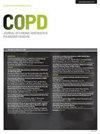对肠道-肺轴的遗传学洞察:肠道微生物群、肺功能和慢性阻塞性肺病的孟德尔随机分析
IF 3.1
3区 医学
Q1 Medicine
International Journal of Chronic Obstructive Pulmonary Disease
Pub Date : 2024-03-04
DOI:10.2147/copd.s441242
引用次数: 0
摘要
背景:慢性阻塞性肺疾病(COPD)是一种病因复杂的呼吸系统疾病,涉及遗传和环境因素。肠道微生物菌群失调与慢性阻塞性肺病有关。孟德尔随机化(MR)提供了一种利用遗传变异作为工具变量来研究因果联系的工具。本研究旨在利用孟德尔随机分析法探讨肠道微生物群、肺功能和慢性阻塞性肺病之间的因果关系:我们利用了来自 MiBioGen、UK Biobank 和 FinnGen 的全基因组关联研究(GWAS)数据,这些数据与肠道微生物类群、肺功能参数(包括一秒内用力肺活量(FEV1)、用力肺活量(FVC)和预测 FEV1 的百分比(FEV1%pred))以及慢性阻塞性肺病的 GWAS 数据有关。进行了磁共振分析,以评估肠道微生物群对肺功能和慢性阻塞性肺病风险的因果效应。敏感性分析用于检验因果关系的稳定性。采用多重检验和反向分析来评估这些关系的稳健性:结果:使用 IVW 方法确定了 64 种因果相关关系。通过敏感性分析、多重检验和反向分析,我们确定了 14 种稳健而稳定的因果关系。与肺功能呈正相关的细菌类群包括脱硫维管束菌科(Desulfovibrionaceae)、红细胞菌科(Erysipelotrichales)、脱硫维管束菌科(Desulfovibrionales)、梭状芽孢杆菌科(Clostridiales)、梭状芽孢杆菌科(Clostridia)、Deltaproteobacteria和红细胞菌科(Erysipelotrichia),而硒单胞菌科(Selenomonadales)和阴沟菌科(Negativicutes)与肺功能呈负相关。霍德曼氏菌的丰度与慢性阻塞性肺病的风险呈正相关,而第十三家族与慢性阻塞性肺病的风险呈负相关:结论:研究发现多个微生物类群与肺功能呈正相关,为益生菌的开发提供了潜在的启示。与肺功能呈负相关而与慢性阻塞性肺病呈正相关的微生物类群的存在强调了肠道微生物群失调对呼吸系统健康的潜在影响。本文章由计算机程序翻译,如有差异,请以英文原文为准。
Genetic Insights into the Gut-Lung Axis: Mendelian Randomization Analysis on Gut Microbiota, Lung Function, and COPD
Background: Chronic obstructive pulmonary disease (COPD) is a respiratory disorder with a complex etiology involving genetic and environmental factors. The dysbiosis of gut microbiota has been implicated in COPD. Mendelian Randomization (MR) provides a tool to investigate causal links using genetic variants as instrumental variables. This study aims to employ MR analysis to explore the causal relationship between gut microbiota, lung function, and COPD.
Methods: We utilized genome-wide association study (GWAS) data from MiBioGen, UK Biobank and FinnGen, which were related to gut microbial taxa, lung function parameters including forced vital capacity in one second (FEV1), forced vital capacity (FVC), and percentage of predicted FEV1 (FEV1%pred), as well as GWAS data for COPD. MR analysis was conducted to assess the causal effects of gut microbiota on lung function and the risk of COPD. Sensitivity analysis was utilized to examine the stability of the causal relationships. Multiple testing and reverse analysis were employed to evaluate the robustness of these relationships.
Results: Using the IVW method, 64 causal correlations were identified. Through conducting sensitivity analysis, multiple testing, and reverse analysis, we identified 14 robust and stable causal relationships. The bacterial taxa that showed a positive association with lung function included Desulfovibrionaceae, Erysipelotrichales, Desulfovibrionales, Clostridiales, Clostridia, Deltaproteobacteria and Erysipelotrichia, while Selenomonadales and Negativicutes showed a negative association with lung function. The abundance of Holdemanella were positively correlated with the risk of COPD, while FamilyXIII exhibited a negative correlation with the risk of COPD.
Conclusion: Several microbial taxa were discovered to have a positive causal correlation with lung function, offering potential insights into the development of probiotics. The presence of microbial taxa negatively correlated with lung function and positively correlated with COPD emphasized the potential impact of gut microbiota dysbiosis on respiratory health.
Methods: We utilized genome-wide association study (GWAS) data from MiBioGen, UK Biobank and FinnGen, which were related to gut microbial taxa, lung function parameters including forced vital capacity in one second (FEV1), forced vital capacity (FVC), and percentage of predicted FEV1 (FEV1%pred), as well as GWAS data for COPD. MR analysis was conducted to assess the causal effects of gut microbiota on lung function and the risk of COPD. Sensitivity analysis was utilized to examine the stability of the causal relationships. Multiple testing and reverse analysis were employed to evaluate the robustness of these relationships.
Results: Using the IVW method, 64 causal correlations were identified. Through conducting sensitivity analysis, multiple testing, and reverse analysis, we identified 14 robust and stable causal relationships. The bacterial taxa that showed a positive association with lung function included Desulfovibrionaceae, Erysipelotrichales, Desulfovibrionales, Clostridiales, Clostridia, Deltaproteobacteria and Erysipelotrichia, while Selenomonadales and Negativicutes showed a negative association with lung function. The abundance of Holdemanella were positively correlated with the risk of COPD, while FamilyXIII exhibited a negative correlation with the risk of COPD.
Conclusion: Several microbial taxa were discovered to have a positive causal correlation with lung function, offering potential insights into the development of probiotics. The presence of microbial taxa negatively correlated with lung function and positively correlated with COPD emphasized the potential impact of gut microbiota dysbiosis on respiratory health.
求助全文
通过发布文献求助,成功后即可免费获取论文全文。
去求助
来源期刊

International Journal of Chronic Obstructive Pulmonary Disease
RESPIRATORY SYSTEM-
CiteScore
5.10
自引率
10.70%
发文量
372
审稿时长
16 weeks
期刊介绍:
An international, peer-reviewed journal of therapeutics and pharmacology focusing on concise rapid reporting of clinical studies and reviews in COPD. Special focus will be given to the pathophysiological processes underlying the disease, intervention programs, patient focused education, and self management protocols. This journal is directed at specialists and healthcare professionals
 求助内容:
求助内容: 应助结果提醒方式:
应助结果提醒方式:


